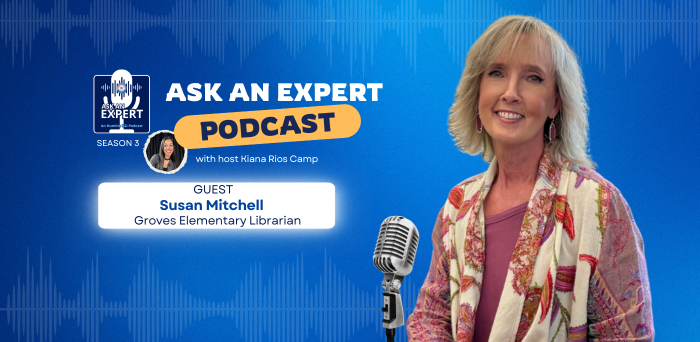Reading aloud isn’t just a bedtime ritual. It can help families boost a child’s vocabulary, empathy, and long-term school success. In a recent Ask an Expert conversation, Susan Mitchell, librarian at Groves Elementary, offered practical tips to help parents make read-alouds enjoyable and effective for toddlers, emerging readers, and independent readers.
Why Read-Alouds Matter
Mitchell, a former reading teacher of 12 years, says reading together supports far more than decoding words. Read-alouds help kids develop vocabulary and critical-thinking skills, and they build social-emotional skills like empathy. It’s also great family bonding because kids love having someone to talk to about what they’re reading.
Start from Day One
Mitchell’s first message is simple: begin early. She suggests starting to read to them the minute babies are born to expose them to vocabulary, reinforcing the connection between print and meaning, and laying a foundation for phonics.
Make it cozy and interactive: put little ones in your lap and let them see and touch the book. Point to pictures, trace words with your finger, and keep it playful so it never feels like schoolwork.
Match the Book to the Reader: The Five-Finger Rule
As children grow, help them choose just-right books with a quick check: The Five-Finger Rule. Open a book and read a page.
4–5 unfamiliar words: probably too hard right now.
2–3 unfamiliar words: a good challenge that builds vocabulary.
0–1 unfamiliar words: comfortable and confidence-building.
Honor Their Reading Choices
Mitchell says that honoring their choices is just as important.
“They may love silly books you don’t find funny anymore,” Mitchell said. “Honor that. Reading is reading.”
Mitchell often hears hesitation about graphic novels. For many readers, graphic novels can be a powerful bridge to longer texts.
“They’re not just comic books,” she said. “Graphic novels demand visual literacy. Much of the exposition happens in the pictures, so kids have to infer and ‘read’ the story beyond the words.”
Early chapter books and decodable texts can help children sound out words, break them apart, and connect letters to sounds. But above all, keep joy at the center.
“If you can get them excited about it, they’ll improve,” Mitchell said. “The more you read, the better you read. It’s a self-fulfilling cycle.”
Mitchell emphasized that audiobooks are real reading because they help get ideas into the brain. Pairing audio with text can be especially helpful for bilingual learners.
Keep Reading with Independent Readers by Reading What They Read
Once kids read on their own, stay connected by dipping into their books, too. As your kids get older, you can borrow their books to discuss them later. Those shared conversations make reading more enjoyable.
District Resource: Sora
Humble ISD students have access to Sora, available in their MyHumble dashboard, with access to e-books and audiobooks students can enjoy on any device. Mitchell notes that Sora’s built-in translation tools and the availability of bilingual picture books make it especially valuable for emerging bilinguals and for students learning Spanish or English. If a title is available in both languages, consider checking out English and Spanish versions to reinforce vocabulary and comprehension.
Make Read-alouds Interactive (without turning it into school)
Keep conversations authentic and curious, not quiz-like. You can try asking questions like: What did you like or not like about this part? Who’s your favorite character, and why? What surprised you? Be sure to share your own opinions, too.
If you’re short of time, you can build reading into everyday life.
Turn on subtitles during a favorite show (sound off for bonus reading).
Read recipes together while you cook.
Listen to an audiobook during commutes.
Make bath time reading time by keeping waterproof or bath-friendly books nearby.
Even 10–15 minutes a day makes a meaningful difference, and if you miss a day, give yourself grace and try again tomorrow.
View the latest Ask an Expert podcast segment:
Susan Mitchell: Benefits of Read-Alouds
Susan Mitchell: Beneficios de la Lectura en Voz Alta
